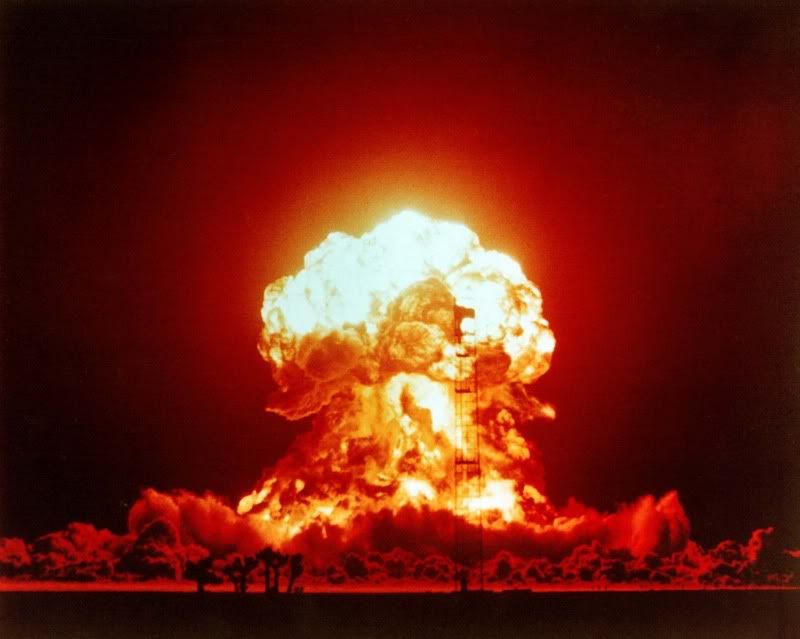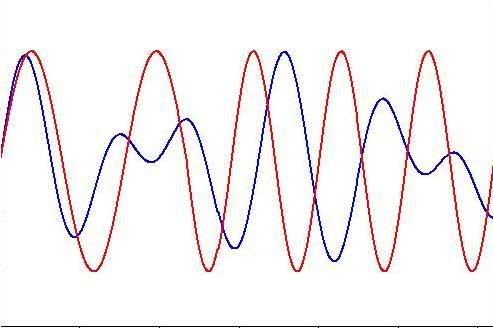(pico and srkpy, back to back. this is why you come here. at 20:48, edt – promoted by Turkana)
The final paragraph of Freud’s Civilization and its Discontents (1930) always chills me:
The fateful question for the human species seems to me to be whether and to what extent their cultural development will succeed in mastering the disturbance of their communal life by the human instinct of aggression and self-destruction. It may be that in this respect precisely the present time deserves a special interest. Man have gained control over the forces of nature to such an extent that with their help they would have no difficulty in exterminating one another to the last man. They know this and hence comes a large part of their current unrest, their unhappiness and their mood of anxiety. And now it is to be expected that the other of the two “Heavenly Powers” eternal Eros, will make an effort to assert himself in the struggle with his equally immortal adversary. But who can foresee with what success and with what result.
Freud added the very last sentence in 1931, when Hitler’s threat had already become clear.
His use of language pointing to the present moment produces an uncanny effect, for while he is surely pointing to his own historical moment, the reverberation of the “present time” and “now” ensure that this foreboding ending forever taps on the reader’s particular historical moment, as if every age were a moment of crisis. And perhaps it is.


Freud understands the unfolding of history as the struggle of Eros, instinct of life, and Thanatos, the instinct of destruction, a struggle without end. His is not the Enlightenment view of history as steady progress toward a perfectible future.
After all of these dark years of BushCo, we find ourselves in the throes of Thanatos, the death drive. The current unrest, anxiety, frustration, unease, rage, pick yer negative affect, we feel only reveals our existence at the threshold of destruction. Will Eros reemerge? And “who can foresee with what success and with what result? We felt the rush of that possibility with the midterm elections. And now we feel despair.
I’d like to delve a little bit into Freud’s notion of civilization and see how the economies of the pleasure principle might help us analyze and transform our times.
For Freud, the formation of civilization crucially requires the willing exchange of happiness in the form of freedom for the security to pursue a more limited happiness: “Civilized man has exchanged a portion of his possibilities of happiness for a portion of security.” This exchange is the very upsurge of the communal body and the rule of law:
The replacement of the power of the individual by the power of a community constitutes the decisive step of civilization. The essence of it lies in the fact that the members of the community restrict themselves in their possibilities of satisfaction, whereas the individual knew no such restrictions. The first requisite of civilization, therefore is that of justice–that is, the assurance that a law once made will not be broken in favor of an individual.

The security provided by civilization is primarily the equalizing principle of law; it is about legal structure and not the state monopoly on violence. Civilization requires the renunciation of certain instinctual aims, and forces these aims to be expressed otherwise, encrypted and articulated in other forms. For Freud, all of the fruits of civilization–ethics, art, science, law–are essentially metaphors replacing renounced instinctual aims.
In the place of unacceptable instinctual urges, we translate the energy we would invest in those aims into other forms of expression that are acceptable to, and in fact expressive of civilization itself. Think of this as a kind of conversion experience of the unacceptable into the exemplary. Neat trick, eh?
The aggressive instinct that must be curtailed, however, seems to haunt every scene, like the threat of violence encrypted in David’s Lynch’s Technicolor suburbs. This encrypted menace is the death instinct streaking through everyday life, and it is to this substratum that the politics of fear, or trauma politics appeals.
It is easy enough to repurpose the sexual instinct into a form that advances civilization; in fact, at first it seems that Eros is not just in service of civilization, but the other way around:
Civilization is a process in the service of Eros, whose purpose is to combine single human individuals, and after that families, then races, peoples and nations, into one great unity, the unity of mankind.
But as Freud progressed in his work, he realized that shadowing the instinct for life, was Thanatos, the instinct for death, the articulation of a “non-erotic aggressivity” that is both powerful and obscure, and that is detectable only when it is intertwined with Eros. Civilization is not just the the servant of Eros, but the stage-setting for a clash of the titans:
Civilization must present the struggle between Eros and Thanatos, between the instinct of life and the instinct of destruction, as it works itself out in the human species.
This clash of titans is the propelling tension that accounts not just for historical movement, but individual development as well, and the mechanism of its movement is captured by Freud’s theory of the pleasure principle.
The Pleasure Principle in a Nutshell (well, in a blockquote box! with free glosses from yours truly!)
- The pleasure principle is thought by Freud to be the automatic regulatory principle of mental events and thus strongly influences our actions.
- The aim of the pleasure principle is the “avoidance of unpleasure or a production of pleasure.”
- Originally, the child can only interpret this in the most literal form: immediate gratification. As responsibilities increase, this tendency for immediacy begins to yield unpleasure.
- The reality principle intercedes to modify the pleasure principle and take into account the demands of reality. This modification allows us to go through present unpleasure for future pleasure. Imho, it marks the entry of the human being into figural understanding, substitution, and translation–into an economy of psychic investments and symbolic operations.
- Considering the symptoms of traumatized WWI vets, Freud was led to wonder about mental events that didn’t operate according to the economics of the pleasure principle: When there is a trauma, “the pleasure principle is is for the moment put out of action.”
Trauma exposes us to the sway of the death drive and repetition compulsion. The death drive is the principle of destruction which aims even at the destruction of every system and economy. Hence, Freud views it as beyond the pleasure principle and threatening to the very coherence of the communal body and body politic.
NB: You may have already noted that there is a crucial asymmetry in the two drives–the one for pleasure and the one for death. Remember that Freud thinks this is an eternal structure without resolution. Thus “progress” is always constructed and contingent, but the regression of the death instinct is actual–that is, death and destruction are in many ways irreversible. This is why we always seem to be fighting an uphill battle. IMHO.
Can we analyze our present political moment and the Rs and Ds according to the economy of the pleasure principle?
Perhaps it seems that the Rs, as the deniers of reality operate strictly under the sway of the unmodified pleasure principle. Immediate gratification. Present pleasure and complete disavowal of the social unpleasure that is growing. We could also imagine that our anemic Ds are also operating according to the immediate demands of pleasure, caring more about this news cycle and that poll, then the overall health of the nation, globe, and even party. They have not let their behavior been influenced by the reality principle–the reality that most of the US population is against the war, want the troops out and voted the Ds in to accomplish that or at least rigorously try to accomplish that.
But I don’t think that we can account for the extreme disconnect between the will of the people and the actions of their elected representatives this way. Rather, our government is operating completely under the sway of the death instinct that both mirrors and exploits the national, post-9/11 PTSR (post-traumatic stress response). That is, the insane BushCo agenda is the articulation of the death drive, and the incomprehensible weakness and repetitive destructive behavior is a kind of political repetition compulsion. This kind of trauma politics and the importance of heightened emotional states for politics is the subject of much excellent work right now in different ways: Al Gore’s The Assault on Reason, Drew Westen’s The Political Brain: The Role of Emotion in Deciding the Fate of the Nation, and Naomi Klein’s The Shock Doctrine
 Naomi Klein’s analysis of the shock doctrine and the rise of disaster capitalism allows us to clearly see the orienting principle of the death drive. It also allows us to glimpse a possible reason why the Rs have been so successful, aside from sheer cheating and criminality….
Naomi Klein’s analysis of the shock doctrine and the rise of disaster capitalism allows us to clearly see the orienting principle of the death drive. It also allows us to glimpse a possible reason why the Rs have been so successful, aside from sheer cheating and criminality….
They have adopted the rhetoric of Eros, the life instinct, while being completely propelled by the death instinct. They are “pro-growth,” “pro-life,” “pro-family values,” pro-more-is-good. The moreness of more that guides them, sheer greed and imperialistic hunger, is not about increasing pleasure and expanding the possibilities for survival, it is the rapid cell division of a cancer. It is the proliferation of a toxic overgrowth that eventually kills.
Given the asymmetry that I described above between Eros and Thanatos, and the regressive negative feed-back loop of the politics of fear, how can we transform the politics of fear into the politics of possibility, of hope? How do we shift from the aneconomic kamikaze movement of the death drive to the just struggle of Eros?
It turns out that the threat of harm crystallized in fear, and the promise of desire and love are both potent times for the reinscription of our mental events. What I’m suggesting is that in this raw emotional state one is primed for fear and desire, and that desire is the opening for the other narrative we seek. (Possibly interesting trivia: The French term for the female orgasm is la petite mort–the little death.)
A helpful clue comes from the neuroscientist Joseph LeDoux, who in “Self: Clues from the Brain” is discussing how one heightened emotional system trumps and shuts down the others, but how (sexual) desire overrides almost every other system. I’m putting “sexual” in parenthesis, because I’m thinking that the pleasure principle is a metaphorical construal of this sexual nature of the drive:
Both eating and sexual arousal are decreased by activation of systems involved in fear and stress. But once aroused, sexual desire can override many other brain systems–people risk all sorts of adverse consequences for a sexual fling … Not only does the arousal of an emotional state bring many of the brain’s cognitive resources to bear on that state, it also shuts down other emotional systems. As a result, during intense emotional arousal,learning is coordinated across systems in a very specific manner, ensuring that the learning that occurs is relevant to the current emotional system. (301-2).
Ann N Y Acad Sci. 2003 Oct;1001:295-304
I take this to be a kind of neuroscientific rendering of the struggle of Eros and Thanatos. The importance for us is that it means that fear can be overcome by desire and that both fear and desire prepare the listener for a kind of learning that creates a feed-back loop upholding the particular heightened emotional state.
We need to turn the voters on.
The U.S population is afraid. Not just of “terrorism” but because of the uncertainty of everyday life, the lack of economic security, healthcare, savings, good education, opportunities, the open-ended nature of our Iraq occupation, the overwhelming menace of the climate crisis.
But they are also desirous of a new direction, they are primed to hear the message of Eros. They want protection, yes, but the also want the protection and hope that comes from the feeling of a true future, with the allure of fulfillment. They want the protection and hope that comes from working together for a just and equitable future, a future of possibility, not just of more, more, more, without meaning.
Dems need to step out of the losing economy of repetition compulsion, tolerate the present unpleasure of working for funding only a withdrawal with date certain. They can make this step just by recognizing the reality principle–that the majority is with them, supporting them, hungering for, desiring a politics of fulfillment and not fear. Responding positively to their constituents, they can create the positive feed-back loop of the politics of a new direction, a just direction. A just direction which crucially includes a proliferation of possibilities for the sublimation of the drives. Dems need to support funding not only for health and education, but for the arts, and innovative living styles and arrangments, new forms of culture. This need is not of a second order, but vital to the functioning of a robust, progressive political form.
So is this all I’m saying–MAKE LOVE, NOT WAR? Not only and not quite, because I think it’s of prime importance to remember that embodied existence has to constantly acknowledge the alluring streak of the death instinct, and it is not something to which progressives are immune. We can’t just bracket violence, death drive, aggression and think it’s something that others do. This is why I always say:
BEWARE GOOD CONSCIENCE
That doesn’t mean that you shouldn’t sleep at night or feel good about what you do, but it does mean that even as we strive to offer another narrative, a viable possibility for a just future, we have to be eternally vigilant to the violence, real and discursive, that we all do. Imho, the true force of progressivism is always beginning your analysis with a recognition of the harm that is being done to someone, somewhere by our principles, practices, and politics. The minute we think that justice is done is when we have failed it.
Thus the eternal struggle of Eros vs. Thanatos as the motor of justice and the granting of our responsibility to the future and to all the others on this big blue marble.


45 comments
Skip to comment form
Author
… and with that I lose my essay virginity here!
for a virgin.
and not too hot on ‘drives’ at all. The whole pneumatic-hydraulic approach….
There are certainly fears, often well-grounded, other times irrational. But the problem is not to let ‘love conquer fear’ the problem is to properly balance love and fear. There are things we *ought* to be afraid of. There are things we ought to love. And sometimes we can only get to love if we have a proper level of fear.
One can tame a vicious dog, but not if one doesn’t both fear it and long to love it.
Ok I go read it now!
But allow me to reiterate….YAY!
neuroscientifically, desire is closer to fear than it is to love. desire and fear elicit the same physical responses, but with different hormones.
and there is definitely sense memory, or ‘learning’ attached to both of these responses.
there’s probably another entire essay (tho not this long…lol…) in the comparison between ‘real’ fear and thrill seeking behavior done for fun, which is all the rage these days. (i do love a roller coaster!!)
this is an amazing essay (set the bar high enough for yourself there?)…thanks!
them into two comments!
Comment 1
First, I want to make a criticism of Freud, as you’ve presented his view here. Then I want to take the criticism back somewhat, and then I was to reassert in the form of a question . . .
So here’s the criticism. This is a myth; it’s false:
Everything we know about the nature and history of the human species, about its evolutionary ancestors and current cousins, tells us that the above story is flatly wrong.
There was no “pre-communal man”. There was no point at the beginning of the human species where humans were all seperate individuals who then came together into communities for the purpose of mutual security.
(This is not to pick on Freud, especially; virtually every thinker in the Western tradition made this same mistake.)
The “homo Robinson Crusoe” view of the origins of the species is utterly mythical. Homo Robinson Crusoe is a myth devoloped by the very civilization which, according to the myth, crushed Homo Robinson Crusoe. It is part of our collective myth about ourselves that overcame something or crushed something which in fact never existed in the first place.
Obviously, this myth is Edenic. That is: Judeo-Christian in origin. Perhaps it predates Judaism, I don’t know. In the capitalist variant, we are supposed to imagine Homo Robinson Crusoe coming together and trading shoes for bananas, or whatever, for mutual benefit. Children are taught this myth in schools.
Everything we know about evolution and our ancestors tells us this is patently ridiculous. Our precursors were naturally communal. We are naturally communal. We did not “come together” for any “purpose” whatsoever.
Having made the criticism, I’ll now take it back a bit. It may be that this myth, as used by Freud, is merely a heurstic — a way of explaining Eros and Thanatos. A helpful story. Or, even if Freud meant it literally, we need not, and it may be that Freud’s theory of the life and death instincts has a great deal of truth to it, despite the mistake about the origin of those instincts.
Now I’ll reassert the criticism in the form of a question: Really? How much of this theory can we accept, seeing that it’s founded on a myth created by a specific civilization for specific purposes, used to suppress or dodge truths about human nature — that we are naturally tribal creatures (or whichever words are best substituted for “natural” and tribal” there.)
?
The basic premise of:
is great.
Not only will it work, it sounds like a lot of fun. And, it comes with the added bonus of driving the fundies nuts! I can just see their little heads exploding in a nice, neat, top-down coordinated approach now.
Cheers.
If we need a hope that cannot be ultimately fulfilled, then what we need is a vision of the future. We had one in the sixties, perhaps a time when Eros was alive, although certainly at war with Thanatos, in spades. We called this future “the Space Program” and this future was part of our national narrative. It had the virtue of being a never-ending, never-fulfillable journey.
We need a story like that. Something to strive toward, rather than something to run from (terrorism). Having a goal makes the obstacles seem less important. When all you have to look at are the obstacles, the dangers, if, that is, you have no future, then everything will seem more frightened. Caught in a never-ending present of fear.
or are they incorporated in our understanding post publishing. Would people accept the dualistic human nature had it not been profered by the likes of Freud. The adaptation of polytheanic musings to post enlightenment dualism always stikes me as rather contrived and even forced. Yin vs. Yang is oxymoronic. I’m more pursuaded by a greater disparity in individual human natures in which eros and thanatos are unequal bit parts adjunct to a host of other characteristics independent of the two. Perhaps that’s more Jungian? Just thoughts.
Great diary.
Have you seen the film Shortbus? It’s superficially about people trying to connect through sex, but the undercurrent throughout is post-9/11 trauma. Basically it starts at Ground Zero and ends with orgasm. Was wondering if you’d seen it and if you had any thoughts on it, from the perspective of trauma studies.
As for voters… hmm. That’s a toughie: how do we not only sell a vision to voters, but also change their thinking. Right now, idealism is considered weak, intellectualism is considered out of touch, and activism is considered crazy: meanwhile we’re saddled with a government that actually is clearly weak, out of touch, and crazy. So it’s not just the message that needs to change, it’s the culture’s attitude towards absorbing messages. Seems like we’ve got a lot of groundwork to lay.
Johnny Rocco: There’s only one Johnny Rocco.
James Temple: How do you account for it?
Frank McCloud: He knows what he wants. Don’t you, Rocco?
Johnny Rocco: Sure.
James Temple: What’s that?
Frank McCloud: Tell him, Rocco.
Johnny Rocco: Well, I want uh …
Frank McCloud: He wants more, don’t you, Rocco?
Johnny Rocco: Yeah. That’s it. More. That’s right! I want more!
James Temple: Will you ever get enough?
Frank McCloud: Will you, Rocco?
Johnny Rocco: Well, I never have. No, I guess I won’t. You, do you know what you want?
Frank McCloud: Yes, I had hopes once, but I gave them up.
Johnny Rocco: Hopes for what?
Frank McCloud: A world in which there’s no place for Johnny Rocco.
http://www.imdb.com/…
I love this analysis. A little over my head and some of the comments really lost me but that’s OK. I learned something and it’s very cool to see this level of discourse here.
You’re off and running srkp23.
jenna jameson for president?
or maybe you explained the depth of the devotion for certain candidates…
the ptsd aspect has been on my mind since day one. we suffered a national trauma, and we’ve been responding to that trauma, not to the evolving reality, ever since.
this also gets to one of the points i’ve been hammering for months: the democrats need to learn how to frame a debate. they also need to learn that the sense of religious mission that motivates the theocratic right wing is an eternal mission: we can never ever believe we have any political battle won.
great stuff, srkp23.